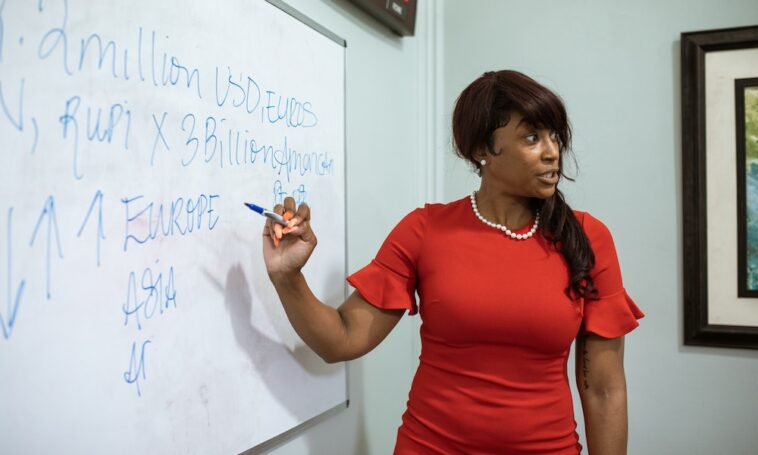Blockchain in Education, In today’s digital age, technology continues to revolutionize various sectors, including education. Blockchain, a decentralized and secure technology, has emerged as a potential game-changer in the field of education. Its unique characteristics offer several benefits and opportunities that can transform the traditional education system. In this article, we will explore the five best roles of blockchain in education, highlighting its impact on verifying credentials and much more.
Blockchain, the underlying technology behind cryptocurrencies like Bitcoin, is a decentralized and transparent digital ledger. It provides a secure and immutable record of transactions or data, eliminating the need for intermediaries. In the context of education, blockchain has the potential to address various challenges and transform the way educational institutions operate.
Read More: How to Stand Out in the B2B EdTech Marketplace?
Explore the Contents
5 Best Roles of Blockchain in Education: Verifying Credentials and More
Enhancing Credential Verification with Blockchain
Blockchain in Education, One of the significant roles of blockchain in education is revolutionizing the process of verifying credentials. Traditionally, verifying educational degrees, diplomas, and certifications has been a time-consuming and cumbersome task. Blockchain technology can streamline this process by creating a decentralized and tamper-proof system for storing and verifying credentials. Educational institutions can issue digital certificates or badges on the blockchain, ensuring their authenticity and reducing the risk of fraud.

Promoting Transparency and Trust in Academic Records
Academic records play a crucial role in assessing an individual’s qualifications and skills. However, the current system often lacks transparency and can be susceptible to manipulation. By leveraging blockchain technology, educational institutions can create a transparent and immutable record of academic achievements. Students’ grades, courses completed, and other relevant information can be securely stored on the blockchain, providing a trustworthy and verifiable source of data.
Facilitating Secure Data Storage and Sharing
Blockchain in Education, Educational institutions handle vast amounts of sensitive student data, including personal information, grades, and assessments. Protecting this data from unauthorized access and maintaining data integrity is paramount. Blockchain technology offers a solution by providing a secure and decentralized data storage and sharing platform. Data stored on the blockchain is encrypted and distributed across multiple nodes, minimizing the risk of data breaches and ensuring data remains intact.
Enabling Efficient and Reliable Peer-to-Peer Transactions
Blockchain in Education, Blockchain’s decentralized nature allows for direct peer-to-peer transactions without the need for intermediaries. In the education sector, this can revolutionize various processes, such as student enrollment, fee payments, and financial aid distribution. With blockchain, these transactions can be executed in a transparent, efficient, and tamper-proof manner, reducing administrative overheads and improving operational efficiency.
Empowering Lifelong Learning and Microcredentialing
Blockchain technology can empower individuals in their pursuit of lifelong learning and professional development. Through the concept of microcredentialing, blockchain enables the creation and validation of smaller, more specialized certifications or badges. Learners can acquire these microcredentials to showcase their skills and knowledge in specific domains, providing a more comprehensive and granular representation of their expertise.
Blockchain in Education, Conclusion
Blockchain in Education, Blockchain technology holds immense potential to revolutionize the education sector. By enhancing credential verification, promoting transparency in academic records, facilitating secure data storage and sharing, enabling efficient peer-to-peer transactions, and empowering lifelong learning, blockchain can pave the way for a more efficient and trustworthy education system. Embracing blockchain in education will require collaboration among educational institutions, policymakers, and technology providers. With careful implementation and adoption, blockchain can bring about positive changes, ensuring the future of education is secure, transparent, and accessible to all.
Read More: 7 Important Impacts of EdTech on Education Equity and Access

FAQs
Q1: Can blockchain technology prevent diploma mills and fake degrees?
A1: Yes, blockchain technology can significantly reduce the prevalence of diploma mills and fake degrees by providing a decentralized and tamper-proof system for verifying credentials.
Q2: How can blockchain ensure data security in educational institutions?
A2: Blockchain ensures data security in educational institutions by encrypting data and distributing it across multiple nodes, making it difficult for unauthorized parties to access or manipulate.
Q3: What are the benefits of microcredentialing using blockchain? A3:
Microcredentialing using blockchain allows individuals to acquire specialized certifications, providing a more comprehensive representation of their skills and expertise.
Q4: Can blockchain improve the efficiency of financial transactions in education?
A4: Yes, blockchain can streamline financial transactions in education by enabling direct peer-to-peer transactions without intermediaries, reducing administrative overheads.
Q5: How can blockchain promote transparency in academic records?
A5: Blockchain promotes transparency in academic records by creating an immutable and verifiable record of achievements, ensuring the integrity and authenticity of academic data.



